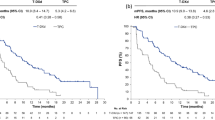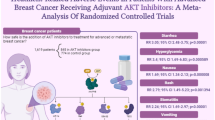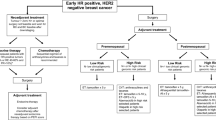Abstract
Purpose
Despite previous studies proposing shorter durations of anti-HER2 therapy for selected patients with HER2-positive early breast cancer (EBC), 12-months remains standard of care. A survey was performed to assess patient perspectives and willingness to participate in studies evaluating shorter durations of anti-HER2 therapy.
Methods
Patients with HER2-positive EBC completing or having previously completed anti-HER2 therapy, were recruited by healthcare professionals at The Ottawa Hospital Cancer Centre to participate in an anonymous online survey. The primary objective was to learn about patients’ perspectives on shorter durations (less than 12-months) of anti-HER2 therapy. Secondary objectives were to explore patients’ interest in clinical trials of shorter durations of anti-HER2 therapy and the degree of increased breast cancer risk they would accept with a shorter treatment duration.
Results
Responses were received from 94 eligible patients. Most patients received Trastuzumab alone (78%, 73/94), while 13% (12/94) received trastuzumab and pertuzumab. Side effects were experienced by 52% (46/89), the most common being; fatigue (61%, 28/46), myalgia (37%, 17/46), and diarrhea (24%, 11/46). Most patients (88%, 78/89) did not find treatment bothersome. Regarding perspectives on shorter durations of anti-HER2 therapy, most (79%, 74/94) respondents stated they would agree to less treatment if it were possible to receive fewer treatments with the same cancer benefits. 56% of patients were interested in clinical trials, however, about half stated they would not be accepting of any increase in breast cancer recurrence risk.
Conclusion
Trials to investigate who can safely and effectively be treated with shorter durations of anti-HER2 therapy are needed. This study provides important insights to patients’ perspectives on shorter durations of anti-HER2 treatment, and their concerns regarding potential increased cancer risk with less treatment.
Similar content being viewed by others
Data availability
The datasets generated and/or analysed during the current study are available from the corresponding author on reasonable request.
Code Availability
Not applicable.
References
Omarini C et al (2022) Jul., T-DM1 efficacy in trastuzumab-pertuzumab pre-treated HER2 positive metastatic breast cancer patients: a meta-analysis, vol. 22, [Online]. Available: https://bmccancer.biomedcentral.com/articles/https://doi.org/10.1186/s12885-022-09556-7
Joensuu H et al (2018) Sep., Effect of Adjuvant Trastuzumab for a Duration of 9 Weeks vs 1 Year With Concomitant Chemotherapy for Early Human Epidermal Growth Factor Receptor 2–Positive Breast Cancer, JAMA Oncol, vol. 4, no. 9, pp. 1199–1206, https://doi.org/10.1001/jamaoncol.2018.1380
Slamon D et al (2011) Oct., Adjuvant Trastuzumab in HER2-Positive Breast Cancer, N. Engl. J. Med, vol. 365, no. 14, pp. 1273–1283, https://doi.org/10.1056/NEJMoa0910383
Piccart-Gebhart MJ, Procter M, Leyland-Jones B, Goldhirsch A Trastuzumab after Adjuvant Chemotherapy in HER2-Positive Breast Cancer | NEJM. Accessed: Nov. 07, 2022. [Online]. Available: https://www.nejm.org/doi/10.1056/NEJMoa052306?url_ver=Z39.88-2003&_id=ori:rid:crossref.org&_dat=cr_pub%20%200www.ncbi.nlm.nih.gov
Romond EH et al (2005) Oct., Trastuzumab plus Adjuvant Chemotherapy for Operable HER2-Positive Breast Cancer, N. Engl. J. Med, vol. 353, no. 16, pp. 1673–1684, https://doi.org/10.1056/NEJMoa052122
Moja L et al (2012) Trastuzumab containing regimens for early breast cancer, Cochrane Database Syst. Rev, vol. no. 4, p. CD006243, Apr. 2012, https://doi.org/10.1002/14651858.CD006243.pub2
Conte P et al (2018) Dec., Nine weeks versus 1 year adjuvant trastuzumab in combination with chemotherapy: final results of the phase III randomized Short-HER study‡, Ann. Oncol, vol. 29, no. 12, pp. 2328–2333, https://doi.org/10.1093/annonc/mdy414
Mavroudis D, Saloustros E, Malamos N, Kakolyris S, study by the Hellenic Oncology Research Group (HORG) Six versus 12 months of adjuvant trastuzumab in combination with dose-dense chemotherapy for women with HER2-positive breast cancer: a multicenter randomized - Annals of Oncology. Accessed: Nov. 07, 2022. [Online]. Available: https://www.annalsofoncology.org/article/S09237534(19)34520-X/fulltext
Earl HM et al (2019) Jun., 6 versus 12 months of adjuvant trastuzumab for HER2-positive early breast cancer (PERSEPHONE): 4-year disease-free survival results of a randomised phase 3 non-inferiority trial, Lancet Lond. Engl, vol. 393, no. 10191, pp. 2599–2612, https://doi.org/10.1016/S0140-6736(19)30650-6
Pivot X et al (2019) Jun., 6 months versus 12 months of adjuvant trastuzumab in early breast cancer (PHARE): final analysis of a multicentre, open-label, phase 3 randomised trial, The Lancet, vol. 393, no. 10191, pp. 2591–2598, https://doi.org/10.1016/S0140-6736(19)30653-1
Conte P, Guarneri V, Bisagni G, Piacentini F, Brandes AA et al (2018) Congress 9 weeks versus 1 year adjuvant trastuzumab for HER2 + early breast cancer: subgroup analysis of the ShortHER trial allows to identify patients for whom a shorter trastuzumab administration may have a favourable risk/benefit ratio, presented at the ESMO 2018
Conte PF et al (2023) Jun., Nine-weeks versus one-year trastuzumab for early-stage HER2 + breast cancer: 10-year update of the Short-HER phase III randomized trial., J. Clin. Oncol, vol. 41, no. 17_suppl, pp. LBA637–LBA637, https://doi.org/10.1200/JCO.2023.41.17_suppl.LBA637
NCCN (2023) National Comprehensive Cancer Network (NCCN) Clinical Practice Guidelines in Oncology. Breast Cancer. Version 4.2023. Mar. 23
Cardoso F et al (2019) Aug., Early breast cancer: ESMO Clinical Practice Guidelines for diagnosis, treatment and follow-up†, Ann. Oncol, vol. 30, no. 8, pp. 1194–1220, https://doi.org/10.1093/annonc/mdz173
Denduluri N et al (2021) Feb., Selection of Optimal Adjuvant Chemotherapy and Targeted Therapy for Early Breast Cancer: ASCO Guideline Update, J. Clin. Oncol, vol. 39, no. 6, pp. 685–693, https://doi.org/10.1200/JCO.20.02510
Basulaiman B et al (Aug. 2019) Creating a pragmatic trials program for breast cancer patients: rethinking clinical trials (REaCT). Breast Cancer Res Treat 177(1):93–101. https://doi.org/10.1007/s10549-019-05274-0
Eysenbach G (Sep. 2004) Improving the quality of web surveys: the Checklist for reporting results of internet E-Surveys (CHERRIES). J Med Internet Res 6(3):e34. https://doi.org/10.2196/jmir.6.3.e34
Cameron D et al (Mar. 2017) 11 years’ follow-up of trastuzumab after adjuvant chemotherapy in HER2-positive early breast cancer: final analysis of the HERceptin adjuvant (HERA) trial. Lancet Lond Engl 389(10075):1195–1205. https://doi.org/10.1016/S0140-6736(16)32616-2
Earl HM, Hiller L, Dunn JA, Conte P, D’Amico R et al (2021) LBA11 - Individual patient data meta-analysis of 5 non-inferiority RCTs of reduced duration single agent adjuvant trastuzumab in the treatment of HER2 positive early breast cancer, presented at the ESMO Congress, 2021
Suter TM et al (Sep. 2016) Trastuzumab-Associated Cardiac adverse effects in the Herceptin Adjuvant Trial. J Clin Oncol. https://doi.org/10.1200/JCO.2006.09.1611
Debien V et al (2023) Aug., DECRESCENDO: de-escalating chemotherapy in HER2-positive, estrogen receptor-negative, node-negative early breast cancer, Future Oncol. Lond. Engl, vol. 19, no. 24, pp. 1655–1667, https://doi.org/10.2217/fon-2022-1282
Macpherson I et al (2022) Feb., Abstract OT2-05-01: The HER2-RADiCAL study (Response ADaptive CAre pLan) - Tailoring treatment for HER2 positive early breast cancer, Cancer Res, vol. 82, no. 4_Supplement, pp. OT2-05-01, https://doi.org/10.1158/1538-7445.SABCS21-OT2-05-01
Eiger D et al (Feb. 2020) Cardiotoxicity of trastuzumab given for 12 months compared to shorter treatment periods: a systematic review and meta-analysis of six clinical trials. ESMO Open 5(1):e000659. https://doi.org/10.1136/esmoopen-2019-000659
Bradbury M et al (2023) Dec., Shorter Durations of Anti-HER2 Therapy for Patients with Early-Stage, HER2-Positive Breast Cancer: The Physician Perspective, Curr. Oncol. Tor. Ont, vol. 30, no. 12, pp. 10477–10487, https://doi.org/10.3390/curroncol30120763
Niraula S, Gyawali B (Jan. 2019) Optimal duration of adjuvant trastuzumab in treatment of early breast cancer: a meta-analysis of randomized controlled trials. Breast Cancer Res Treat 173(1):103–109. https://doi.org/10.1007/s10549-018-4967-8
Booth CM et al (Aug. 2023) Common sense oncology: outcomes that matter. Lancet Oncol 24(8):833–835. https://doi.org/10.1016/S1470-2045(23)00319-4
Freedman RA et al (2022) Dec., Breast cancer knowledge and understanding treatment rationales among diverse breast cancer survivors, Breast Cancer Res. Treat, vol. 196, no. 3, pp. 623–633, https://doi.org/10.1007/s10549-022-06752-8
REaCT : REthinking Clinical Trials. Accessed: Jan. 11, 2024. [Online]. Available: https://react.ohri.ca/react-her-time/
Wang H, Yee D (2019) I-SPY 2: a Neoadjuvant Adaptive Clinical Trial Designed to Improve Outcomes in High-Risk Breast Cancer, Curr. Breast Cancer Rep, vol. 11, no. 4, pp. 303–310, Dec. https://doi.org/10.1007/s12609-019-00334-2
Funding
This research did not receive any specific grant from funding agencies in the public, commercial, or not-for-profit sectors. Dr. Michelle Bradbury is a post-graduate year 4 resident in medical oncology at McMaster University and was involved in the study on a volunteer basis. This work was supported internally by the Rethinking Clinical Trials (REaCT) program at the Ottawa Hospital, which is supported by The Ottawa Hospital Foundation and its donors.
Author information
Authors and Affiliations
Contributions
MB, SM, MC, MS, LV, and JH were involved in designing the survey and preparing the protocol. LV, LC and CS collected the data and coordinated the study. MB, LC, MC and SM wrote the manuscript. All authors had full access to the data and took responsibility for the integrity of the data and accuracy of the data analysis. All authors were involved in the critical review of the manuscript and approval of the final version.
Corresponding author
Ethics declarations
Conflict of interest
The authors have no conflict of interest to declare.
Ethics approval
Ethics approval was obtained by the Ontario Cancer Research Ethics Board.
Consent to participate
Completion of the survey implied consent to participate.
Consent for publication
Completion of the survey implied consent to publish aggregate data.
Additional information
Publisher’s Note
Springer Nature remains neutral with regard to jurisdictional claims in published maps and institutional affiliations.
Electronic supplementary material
Below is the link to the electronic supplementary material.
Rights and permissions
Springer Nature or its licensor (e.g. a society or other partner) holds exclusive rights to this article under a publishing agreement with the author(s) or other rightsholder(s); author self-archiving of the accepted manuscript version of this article is solely governed by the terms of such publishing agreement and applicable law.
About this article
Cite this article
Bradbury, M., Savard, M., Stober, C. et al. Perspectives on shorter durations of anti-HER2 therapy in early-stage HER2-positive breast cancer: a patient survey. Breast Cancer Res Treat 206, 473–481 (2024). https://doi.org/10.1007/s10549-024-07302-0
Received:
Accepted:
Published:
Issue Date:
DOI: https://doi.org/10.1007/s10549-024-07302-0




